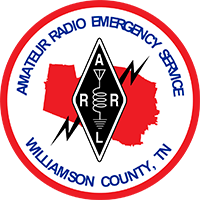Bill Gerth, W4RK
Bill ‘Fearless Leader’ Gerth, W4RK Jan 2004 – Feb 2006
After Doc Randy’s resignation, a group of amateurs who were some of the original members of the ARES organization met to discuss finding someone to take over the leadership role for the group. We had established a strong support team, and the group turned to a ham who had been present at the initial organizational meeting in the mid 1990s, Bill Gerth, W4RK. The group invited Bill to a luncheon and presented the case for him to take over as Emergency Coordinator. There was a long silence but finally Bill said he would accept the position.
The formal WCARES organization was born and with Bill’s leadership the group really started to grow. Bill appointed members to the Planning Committee and concrete details of how the organization would operate and respond to an actual emergency were developed. A special effort was made to reach out to served agencies, and relationships were developed with the Red Cross, Emergency Management, Health Department and the cities of Franklin and Brentwood.
There was already a strong relationship with the Department of Emergency Communications through its Director, Bill Jorgensen, K4COM, a member of the WCARES Planning Committee, as well as a strong relationship with the Department of Emergency Medical Services through its Director, Allen Lovett, K4XXG, also a member of the WCARES Planning Committee. A good relationship was facilitated with the County Sheriff’s Department through Planning Committee member Tom Neill, K4XG, head of the Reserve Deputy Sheriff program. Additionally, WCARES initiated relationships with other ARES groups in adjacent counties, particularly Davidson, Maury and Rutherford.
WCARES participated in ARRL Field Day for the first time in 2004– a tradition that has continued to the present. This exposure of Amateur Radio’s capabilities to governmental officials and the general public has been very valuable. The Planning Committee initiated regular field exercises using realistic scenarios that utilized the repeater system as well as simplex voice communications. Later, digital communications were included with the addition of APRS digipeaters and Winlink connectivity. It was during Bill’s tenure that WCARES involvement in digital communication began to take shape. Alex Kelly, WU2W, was selected to lead the WCARES Digital Initiative.
The digital program took two directions– the first was getting members to equip their vehicles with APRS capabilities and more than a dozen members responded to this challenge. A software program was loaded on one of the computers in the WC4EOC radio room which displayed a map of the county. We were able to see the APRS equipped vehicles on the computer screen which allowed us to dispatch the closest vehicle to a new location without having to tie up the repeater system by asking where the vehicles were located. The second part of the digital initiative was incorporating Winlink into our operations. We were fortunate that one of the members of the Winlink development team Steve Waterman, K4CJX was a WCARES member. With Steve’s in-depth knowledge of all aspects of Winlink protocol and the support of the WCARES Planning Committee, a formal program to integrate Winlink into the WCARES ‘toolbox’ began to take shape.
Bill Jorgensen’s belief in the Winlink system and his willingness to budget for the hardware needed insured that Winlink would become a reality in Williamson County. WCARES became one of the ARES leaders in the nation in using Winlink. Both the county and the city of Brentwood were linked together with redundant VHF, UHF and 1.2 GHz radios and could now provide “last mile” communications capability in a seamless manner. Additionally, two Winlink drop kits were designed and built to provide portable operation.
WCARES members attended training sessions and were checked out on operation of the drop kits. Requests came in from amateur organizations near and far wanting to know more about WCARES and Winlink. Bill Gerth, W4RK, wrote a three part article for publication in the August, September and October 2005 issues of QST.
Also during Bill’s tour of duty, hurricane Katrina devastated New Orleans and evacuees from New Orleans were brought to a Red Cross shelter in Franklin. Bill got word from the Red Cross officials that they needed communications help until they could get additional phone lines installed. Bill notified members of the Planning Committee, a duty roster was made and WCARES members reported for duty providing communications between the shelter and the Chapter HQ until a sufficient number of telephone lines were installed, which took approximately one week.
Several days into the operation, the Red Cross was alerted of a possible much larger influx of evacuees. Although not actually part of the communication support we were providing, a crew of WCARES members volunteered to assist Red Cross and County Officials prepare a shelter capable of housing several hundred evacuees. This assistance included installation of wireless internet access, telephone and television systems in a large facility, as well as amateur VHF and UHF radio capability. Although the shelter was not utilized to its full capacity, it showed the county leadership the willingness of WCARES members to help when and where we were needed.
Bill, W4RK, and two other WCARES Planning Committee members, Bill, K4COM and Allen, K4XXG served as committee members on the Homeland Security District 5 Communications Task Force. They played key roles in developing Federal grant proposals and interoperability procedures for a group of several Middle Tennessee counties related to public safety and amateur radio communications. Toward the end of 2005, Bill announced that he and his wife were going to move to Jefferson City, MO, to be closer to their children and grandchildren. We were going to miss Bill, but it was time to look for another EC.
